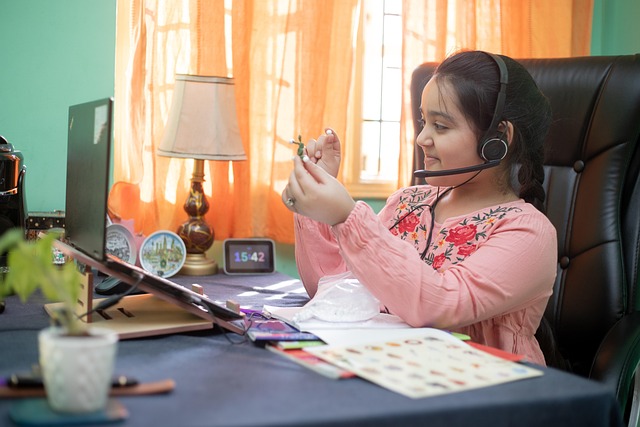Remote Semaglutide Therapy (RST) leverages digital technology to provide patients with convenient, accessible diabetes management through secure video conferencing, mobile apps, and online portals. This approach eliminates frequent in-person visits, enhances patient satisfaction, promotes adherence to treatment plans, and leads to improved health outcomes for individuals with type 2 diabetes and weight loss. Effective remote therapy requires clear communication channels, goal setting, patient education on digital tools, regular check-ins, and continuous monitoring based on real-time feedback. Online consultations address challenges like patient adherence and education by offering personalized guidance and support, ultimately leading to better blood sugar control and reduced complications. The future of RST looks promising with expanding access and efficient management through innovative online platforms.
“Revolutionize diabetes management with remote semaglutide therapy, a modern approach leveraging technology. This innovative treatment, facilitated through online consultations for semaglutide, offers unprecedented accessibility and convenience. From understanding the basics to navigating digital processes, this article explores every aspect of remote therapy management.
Discover who benefits most, how to conduct effective sessions, and strategies for monitoring progress remotely. We also address common challenges and glimpse into the future where technology enhances diabetes care even further.”
Understanding Remote Semaglutide Therapy: A Modern Approach

In today’s digital era, Remote Semaglutide Therapy (RST) has emerged as a game-changer in healthcare, offering patients convenient and accessible management options for their semaglutide treatment. This modern approach eliminates the need for frequent in-person visits by facilitating online consultations with healthcare professionals. Patients can receive expert guidance, have their questions answered, and even adjust their dosages remotely, making it an ideal solution for those seeking flexibility and ease in managing chronic conditions.
RST leverages technology to bridge the gap between patients and their care teams. Through secure video conferencing, mobile apps, or online portals, patients can connect with doctors, dietitians, and other specialists who provide personalized support tailored to their unique needs. This innovative strategy not only enhances patient satisfaction but also promotes better adherence to treatment plans, ultimately leading to improved health outcomes.
Online Consultations for Semaglutide: Benefits and Feasibility

The rise of digital health technology has paved the way for innovative solutions in medication management, particularly for treatments like semaglutide, a medication used for type 2 diabetes and weight management. Online consultations for semaglutide therapy offer several advantages. Patients can conveniently schedule virtual meetings with healthcare professionals from the comfort of their homes, eliminating the need for physical visits, which is especially beneficial for individuals with limited mobility or those living in remote areas. This accessibility enhances patient compliance and adherence to treatment plans.
Feasibility studies have shown that online consultations for semaglutide can effectively monitor patient progress, provide medication adjustments, and offer personalized guidance. Through secure video conferencing platforms, doctors can conduct thorough assessments, discuss treatment outcomes, and address any concerns or side effects. Moreover, digital tools enable remote monitoring of vital signs and glucose levels, allowing healthcare providers to make informed decisions and ensure optimal therapy management without constant in-person visits.
Patient Selection: Who is a Suitable Candidate?

Patient selection is a critical aspect of remote semaglutide therapy management, as it ensures that the right individuals benefit from this innovative treatment approach. Suitable candidates for online consultation and semaglutide therapy are typically those with type 2 diabetes who have not achieved their glycemic goals despite optimal diet and exercise. This includes patients with a body mass index (BMI) of 27 or higher, as semaglutide has shown promising results in weight management and improving metabolic health.
The ideal patient should also be willing to commit to the online consultation process, have access to reliable technology for remote monitoring, and understand the importance of adhering to medication regimens. Those with a history of severe allergies or who are pregnant or planning pregnancy may not be suitable candidates and require further evaluation. Regular communication with healthcare providers during online consultations is essential to ensure safety, efficacy, and satisfaction with the treatment.
The Digital Process: Setting Up Virtual Appointments

In today’s digital era, remote semaglutide therapy management has become a viable and convenient option for patients. The process begins with an initial online consultation for semaglutide, where healthcare providers offer virtual appointments to discuss treatment plans and assess patient suitability. This approach not only eliminates geographical barriers but also streamlines the patient journey by allowing for regular check-ins and adjustments without the need for frequent in-person visits.
Through secure video conferencing platforms, patients can interact with their doctors from the comfort of their homes. During these virtual appointments, medical professionals review treatment progress, address any concerns, and make necessary changes to semaglutide dosages or administration methods. This digital process ensures continuity of care while providing patients with a flexible and accessible means of receiving specialized diabetes management support.
Conducting Effective Remote Therapy Sessions

Remote therapy sessions for semaglutide management have become increasingly popular, especially in today’s digital era. To ensure effective online consultations, healthcare professionals should establish clear communication channels and set specific goals at the outset. This includes educating patients on the use of video conferencing tools, scheduling regular check-ins, and providing easy access to resources like patient portals where they can track their semaglutide dosages and share relevant data.
During sessions, it’s crucial to create a safe and non-judgmental environment, encouraging open dialogue about medication adherence, side effects, and lifestyle changes. Utilizing interactive features of video conferencing platforms can foster engagement. Additionally, remote therapy allows for continuous monitoring and adjustments to treatment plans based on real-time feedback, making semaglutide management more accessible and personalized for patients.
Monitoring and Adjustments: Staying on Track Remotely

Staying on track with remote semaglutide therapy management requires effective monitoring and adjustments, especially since patients can’t physically visit their healthcare providers regularly. Online consultations for semaglutide play a pivotal role here. Through telemedicine platforms, healthcare professionals can remotely assess patient progress, discuss any concerns or side effects, and make necessary changes to the treatment plan. This includes adjusting dosage or switching medications based on real-time data shared by patients, such as weight changes, blood sugar levels, and overall well-being.
Regular online consultations ensure timely interventions, preventing potential issues from escalating. Patients can easily report their symptoms or difficulties using secure digital tools, fostering open communication. This remote approach not only enhances accessibility but also promotes patient engagement in their care, leading to better outcomes and improved quality of life.
Overcoming Challenges: Addressing Common Concerns

Remote semaglutide therapy management offers a convenient and accessible approach to treating conditions like type 2 diabetes, but it’s not without its challenges. Common concerns include patient adherence, medication safety, and adequate education on self-injection techniques. However, these can be effectively addressed through innovative solutions. Online consultation for semaglutide plays a pivotal role in bridging these gaps. By providing virtual access to healthcare professionals, patients receive personalized guidance, ensuring they understand their treatment plan and feel comfortable with the medication’s administration.
Additionally, regular online check-ins allow healthcare providers to monitor patient progress, address any emerging issues, and make necessary adjustments to the therapy regimen. This proactive approach not only enhances patient satisfaction but also improves clinical outcomes by maintaining optimal blood sugar levels and reducing the risk of diabetes-related complications.
Future Prospects: Enhancing Accessibility with Technology

The future of remote semaglutide therapy management holds immense potential, particularly with advancements in technology. Online consultation platforms can play a pivotal role in enhancing accessibility to this innovative treatment option. Patients who may have previously faced barriers due to geographical constraints or time limitations can now benefit from virtual consultations with healthcare professionals. This shift enables individuals across diverse locations to receive personalized guidance and monitoring, fostering a more inclusive healthcare ecosystem.
Digital tools can streamline the entire process, from initial patient education to ongoing support. Telehealth platforms equipped with interactive features allow for dynamic discussions about semaglutide regimens, addressing concerns, and tailoring treatment plans. Moreover, digital health technologies offer continuous data tracking and remote monitoring capabilities, ensuring timely interventions and adjustments as needed. By leveraging these innovations, healthcare providers can efficiently manage a larger patient volume while maintaining the quality of care.
